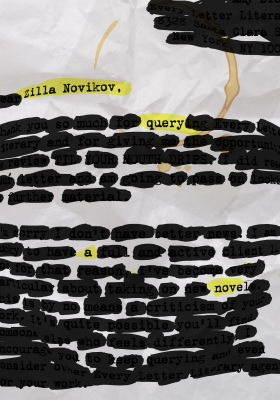Back to the Indie Corner series
I’m thrilled to introduce Zilla Novikov and her new novel Query (tRaum, April 27, 2023). At the end of 2022, in December’s Dragonfly newsletter, I talked about increasing essays rather than interviews coming in the new year, and this is the first Indie Corner to go that route. Thanks so much to Zilla for being the first author to take this on. Her novel Query is a unique, witty perspective on an author’s activist-through-art frustrations in getting her book noticed and published. While recognizing these frustrations, I, as a reader, also innately understood the satire, and laughed often while reading, even though I recognized the madness one feels in the constant repetition of our activists’ voices. When chatting with Zilla recently, I was reminded of a quote from a novel I read during college: “We all feel that our generation didn’t get a chance to make any positive political contributions because we were totally occupied with just trying to stop the madness.” The book was Hot Flashes, by Barbara Raskin, published in 1987. Generations later, we are still trying to stop the madness (continued climate, political, economic, and social imbalances), and sometimes we get stuck in this rut of protest when we just want to move forward, past the same-old, same-old. Balancing ecological concern, style, humor, publishing woes, and still telling a solid story, Query is a must-read for this age.
 There’s a great podcast about activism called Pod Save The People. At the end of an interview, DeRay Mckesson invariably asks his guest how they stay hopeful to sustain the Work. The answers always frustrate me. I’m not hopeful. 1.5 degrees Celsius is a death sentence for millions, maybe billions, of people, mostly in the Global South. But I don’t stop the Work, because 1.6 is worse. Every day I can delay a bulldozer tearing through the Greenbelt matters to someone who will have fresher air to breathe, who might survive their asthma one day longer. Even if my Work didn’t matter—and I believe it does—I wouldn’t stop, because that’s who I am. It’s not about hope for me. It’s what I have to do.
There’s a great podcast about activism called Pod Save The People. At the end of an interview, DeRay Mckesson invariably asks his guest how they stay hopeful to sustain the Work. The answers always frustrate me. I’m not hopeful. 1.5 degrees Celsius is a death sentence for millions, maybe billions, of people, mostly in the Global South. But I don’t stop the Work, because 1.6 is worse. Every day I can delay a bulldozer tearing through the Greenbelt matters to someone who will have fresher air to breathe, who might survive their asthma one day longer. Even if my Work didn’t matter—and I believe it does—I wouldn’t stop, because that’s who I am. It’s not about hope for me. It’s what I have to do.
I finally found something to sum up what hope means to me, in case I ever meet DeRay. It’s a Jewish proverb, Pirkei Avot 2:16. “It is not your duty to finish the work, but neither are you at liberty to neglect it.” That line is on the first and last page of my satirical novella Query.
In Query, a heavily fictionalised version of myself, “Zilla Novikov,” is writing to literary agents looking for someone to represent her novel. The book within a book she’s querying is eco-fiction inspired by her job as a city planner—a job that brings her up close and personal with the everyday effects of climate change. As her frustrations grow with working inside the system, she falls in with a group of environmental activists and discovers a different route to create meaning in her life.
Publishing and environmental activism might seem like unlikely bedfellows, but in this permacrisis, these struggles have the same root cause. We inhabit an explorative system, designed to extract as much as possible—from people, from the planet—heedless of consequences. As a result, the Earth is dying and we’re all burned out. To the extent there is money in publishing, Amazon is making most of it, and literary agents are struggling to keep their heads above water. I like to think my weird niche books have literary merit, or at least are a satisfying read, but they’re not going to put ramen on an agent’s table. My odds of finding a winning lottery ticket on the sidewalk are higher than my odds of finding representation. During the self-induced bloodletting that was my querying experience, I sent a lot of very polite letters to agents, and my friends and I drafted a lot of letters which were much more honest and much less polite and I did not send them. But “Zilla Novikov” did. “Zilla” gets to express her feelings about neoliberal attitudes towards art and the environment in ways that are not compatible with my need to actually keep my job.
Writing Query was partly therapy, a story where I got to satirise the many frustrations of life in late-stage capitalism. It was also activism through art. I was a late bloomer to activism, going to my first environmental protest at nearly 40, and I had no idea what to expect. As a giant nerd, stories—often science fiction and fantasy—are how I prepare myself for the unknown, imagining new interactions in strange scenarios. From Hunger Games to Snow White and the Huntsman, fictional activism is usually presented as a symbolic moment followed by an impromptu mass mobilisation. It’s far less common to see a depiction of the slow labour of organising, of relationship building, of communication. We don’t get to see the Work, only the culmination of it. This leaves baby activists like my past-self intimated by the process and unsure where we could possibly fit. One of my goals in writing Query was to give a roadmap to people like my past-self.
Activism isn’t all roses. It’s deeply frustrating, as you attend endless meetings where the same ideas are hashed and then rehashed. Depending on circumstances, it can be terrifying—one of the hardest moments I’ve lived through was watching cops assault my comrades and knowing the most I could do was bear witness. But it’s also uniquely rewarding. Before I found activism, I was one of the few people in my circle freaking out about the climate emergency, and it felt like being the only person marching in step at the parade. Finding a community of friends who shared my values, taking action against the thing that most scared me—it was, and is, the most rewarding thing. I tried to show these experiences to demystify activism in Query. I don’t know my book is going to make any more of a difference than your average green-washing and rainbow-washing corporate bullshit fiction, but I tried to write a non-didactic call to action. I hope I succeeded at least a little.
Activism is best done in solidarity. I adopt that approach to my writing as well; it takes a village to raise a novel. My first published work was a community-sourced cookbook with recipes to help people survive mental illness, burnout, and other reasonable responses to late-stage capitalism. The Sad Bastard Cookbook: Food You Can Make So You Don’t Die is co-written with Rachel A. Rosen. Rachel is also an activist/author. Her first novel, Cascade, is about climate change releasing deep magic, and how humanity responds. Fans of her book will notice that I borrowed (with permission of course) her activist protagonists as side characters in Query. Writing is like swimming—don’t go in the water alone.
If you want to read Query, all the book-purchasing links are available at the tRaum website. We’re doing a limited run of special edition palm-sized print books in a swag-filled book box, and then print books and e-books will be available forever. That version has a special cover deemed too risque for Amazon. If you want to hear more from me, Rachel, and the rest of our artist collective, subscribe to our newsletter Night Beats News.
-Zilla Novikov

Zilla Novikov (she/ her) lives in a society, and she’s not too happy about it. She finds some relief from this soul-crushing neoliberal hellscape in the thoughtful arrangement of letters into words. If you also enjoy words, you might like her novella Query or her co-written recipe book, The Sad Bastard Cookbook: Food You Can Make So You Don’t Die.
In the bad old days she was querying, Zilla was informed that no one signs authors without a social media presence, so you can find her on the less reprehensible corners of the internet. Or on Night Beats. She’s there too. She’s very proud of her newsletter.